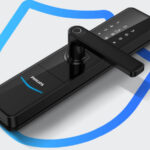Smart Locks – High Tech Solution or Just a Fad?

In an era where technology incessantly permeates every aspect of our lives, the home security landscape is no exception. One innovation that has garnered substantial attention lately is the smart lock. Digitally enabled and sophisticated, these locking mechanisms seem to pave the way for keyless living. But, are these locks a genuine revolutionary solution to traditional locking systems, or merely a transient trend set to fade away with time? This article probes this thought-provoking quandary.
The Evolution of the Key
From ancient wooden contraptions to metal locks and keys to coded keypads, the way we secure our homes has evolved significantly over centuries. The most recent development in this long lineage of locks is the smart lock. At their core, these devices eliminate or supplement traditional lock-and-key systems, offering keyless access through a smartphone app, key fobs, or biometric data like fingerprints.
This transformation from metal keys to digital codes doesn’t just signal convenience, it also ushers in a slew of potential benefits. These include remote access, advanced visitor access management, and seamless integration with other smart devices. However, as we marvel at these high-tech security solutions, we must ask: are smart locks a fundamental, lasting upgrade to our home security, or are they just the latest tech gadgetry doomed to lose its sheen?
Smart Locks: The Security Revolution
The increasing adoption of smart locks in both residential and commercial spaces underscores their potential as a reliable, long-term solution. Far from being mere novelty items, they address genuine concerns in our rapidly digitizing world.
Consider, for example, the remote access feature. With the advent of the sharing economy, platforms like Airbnb have seen a massive surge. For hosts who don’t live near their rental properties, smart locks can offer remote access to guests, eliminating the need for key hand-offs or hide-a-keys. In 2022, August Home, a leading smart lock manufacturer, reported that its locks were used in over 200,000 Airbnb listings, highlighting the increasing demand and practicality of this technology in real-world applications.
Moreover, the integration feature of smart locks allows them to interact with other smart devices, creating a harmonious smart home ecosystem. Imagine your front door unlocking automatically as you approach and triggering a sequence of events – your lights turning on, your thermostat adjusting to a comfortable temperature, and your favorite music starts to play. This isn’t a scene from a science fiction movie; it’s a reality for many homeowners who’ve embraced smart home automation.
Fading Fad or a Lasting Legacy?
While the features of smart locks may seem compelling, skeptics argue that they might be just a passing fad. There are genuine concerns to consider. Hacking threats, for instance, are a pressing issue. While most smart lock manufacturers emphasize robust encryption methods to secure communication between the lock and the user device, no technology is impervious to determined hackers. An instance from 2016 saw a security flaw in August Smart Locks that allowed hackers to use a low-cost device to intercept the lock’s signals, unlocking doors without authorization.
Then, there are technology glitches. Traditional locks can last for years, if not decades, with little to no maintenance. However, smart locks, like any other technology-based product, can face system errors, software bugs, or connectivity issues. Also, unlike a traditional lock, a smart lock’s functionality is subject to power availability. A dead battery or power outage can potentially lock users out of their own homes.
Finally, there’s a significant cost consideration. A traditional deadbolt lock can cost anywhere from $10 to $50, while smart locks generally start at around $100 and can go up to $300 or more, depending on the features. So, is the added convenience worth the extra cost? Many consumers might not think so.
Conclusion: A Balanced Verdict
The question of whether smart locks represent a revolutionary solution or a fleeting trend doesn’t have a binary answer. Indisputably, they are part of a broader movement towards a more connected, digitized world. However, their long-term relevance will hinge on how effectively they address the concerns of skeptics.
The enhancement of cybersecurity measures, reliability improvements, and building public trust in the technology is pivotal for smart locks to transcend from a trendy gadget to an integral component of modern home security. Consumer adoption trends will also play a crucial role in determining their future. According to a report by Statista, the smart lock market’s global revenue is projected to grow from $1.2 billion in 2020 to approximately $3.6 billion by 2024, hinting toward a positive trajectory.
So, if you’re considering updating your home security system, it’s essential to weigh the pros and cons, research different models, and think about how comfortable you are with using technology in such a critical aspect of your home. Ultimately, the goal of any lock – smart or traditional – is to provide security and peace of mind, not to introduce new complications.
Thus, it’s safe to conclude that technology serves us best when it complements our needs and seamlessly integrates into our lives. Whether it’s here to stay or not, it should enhance our lifestyle, not complicate it.
Frequently Asked Questions
What are some of the main brands of smart locks?
Brands like August, Schlage, Yale, and Kwikset are among the most popular manufacturers of smart locks.
How secure are smart locks against hacking?
While smart locks use encryption to protect against hacking, no system is completely immune. It’s essential to ensure that both the smart lock and the device it communicates with have robust security measures.
What happens if a smart lock runs out of power?
Most smart locks will alert you when their battery power is low. However, if ignored, the lock may stop working. Some models have a manual key option or an external battery port for such situations.
Are smart locks suitable for all kinds of doors?
The compatibility of smart locks may vary based on the door thickness, design, and existing lock setup. It’s best to check the manufacturer’s specifications before purchasing.
Can smart locks integrate with my other smart home devices?
Many smart locks are designed to integrate with other smart home systems like Amazon Alexa, Google Home, or Apple HomeKit, offering an integrated home automation experience.
Are smart locks worth the cost?
This depends on your specific needs. If you value the convenience, remote access capabilities, and potential integration with other smart devices, a smart lock could be a worthwhile investment.
What if the smart lock’s technology glitches or fails?
Like any piece of technology, smart locks can have their issues. Most smart lock companies offer customer support, and it’s recommended to test your lock thoroughly during the warranty period.
How difficult is it to install a smart lock?
Many smart locks are designed for easy installation, often requiring just a screwdriver. However, some models may need professional installation, especially if they’re part of a broader smart home system.
Can a landlord install a smart lock?
The laws around this vary by location, but generally, landlords can install smart locks as long as they provide tenants with access. It’s recommended to check local regulations before installation.
How long do smart locks last?
The lifespan of a smart lock depends on usage, make, model, and the environment in which it’s installed. However, they typically last a few years before needing a replacement or significant maintenance.



Leave a Reply
Want to join the discussion?Feel free to contribute!